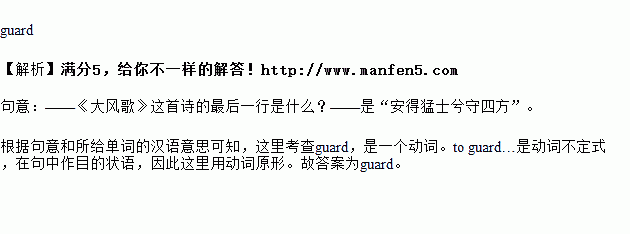题目内容
— What's the last line of the poem Song of the Great Wind?
— It's Where can I find brave men, oh! To ________ (守卫) my four frontiers today!
 怎样学好牛津英语系列答案
怎样学好牛津英语系列答案假如你是李华。你在某英文网站看到一则招聘中国志愿者的广告。请根据该广告中所提供的两个志愿者项目, 结合你的实际情况选择其中的一个项目并给项目负责人写一份email, 表达你希望参加这个项目的愿望, 并阐述理由。
Project One Place: A small village in a poor area of China Activities: ①teach children English ②visit the old people's home ③work on the farm | Project Two Place: A middle school in Japan Activities: ① set up a cultural exchange center ②give Chinese lessons ③ play games with Japanese children |
要求: (1) 邮件中必须包含招聘广告中的信息, 并适当发挥。
(2) 文中不能出现与你身份相关的信息。
(3) 词数:不少于90个词。邮件的开头和结尾已给出, 不计入总词数。
Dear Sir/Madam,
I am Li Hua, a middle school student from China. I want to be a volunteer ______________________________________________________________________________________________________________________________________________________________________________________________________________________________________________________________________________________________________________________________________________________________________________________________________________________________________________________
Looking forward to your early reply!
Yours,
Li Hua
Forgiveness (原谅,宽恕) means different things to different people. Generally, however, it includes a decision to let go of anger and thoughts of revenge (复仇). The act that hurt or displeased you might always be with you, but forgiveness can reduce its control on you and free you from the control of the person who harmed you. Forgiveness can even lead to feelings of understanding for the one who hurt you. How do you start to forgive? Try the following steps.
Calm yourself. To remove your anger, try a simple stress-management way. "Take a couple of breaths and think of something that gives you pleasure: a beautiful scene in nature, someone you love, " Frederic says.
Don't wait for an apology. "Many times the person who hurt you has no plan to apologize, " Frederic says. "They may have wanted to hurt you or they just don't see things the same way. So if you wait for people to apologize, you could be waiting an awfully long time. " Keep in mind that forgiveness does not mean balancing with the person who upset you.
Keep off the unpleasant. Mentally replaying your hurt gives power to the person who caused your pain. "Don't pay attention to your wounded feelings, learn to look for love, beauty and kindness around you," Frederic says.
Realize forgiveness is helpful. Research has shown that people who forgive have more energy, better appetite and better sleep pattern.
Don't forget to forgive yourself. "For some people, forgiving themselves is the biggest challenge, " Frederic says. "But it can rob you of your self-confidence if you don't do it. "
Title | Forgiveness | |
The meaning of forgiveness | Deciding to let the anger go away | |
Get away from the thought of 1. others | ||
The function of forgiveness | Reducing and being free from control | |
Causing understanding for 2. who hurt you | ||
3.on how to start to forgive | Calming yourself | Breathe and consider something that make you 4.. |
5. waiting for an apology | 6.that forgiveness doesn't have the meaning of balancing with others. | |
Keeping off the unpleasant | Look for 7. nice and beautiful instead of paying attention to the wounded feelings | |
Realizing forgiveness does some 8. | Get more 9., eat and sleep well. | |
Remembering to forgive yourself | Your confidence will be robbed 10. forgiving yourself. |



